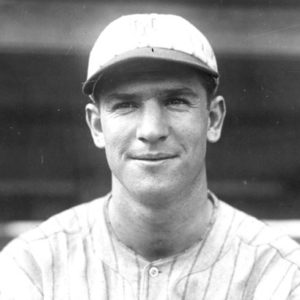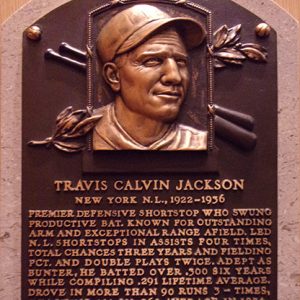calsfoundation@cals.org
Travis Calvin Jackson (1903–1987)
Travis Calvin Jackson was one of six native Arkansans elected to the National Baseball Hall of Fame. He played for the New York Giants and was considered the best National League shortstop in the 1920s. Noted for his defense (which earned him the nickname “Stonewall”), he was also considered a clutch hitter.
Travis Jackson was born on November 2, 1903, in Waldo (Columbia County) to William Calvin Jackson, a storekeeper, and Etta Farrar Jackson. As a teenager, Jackson played for a team at Ouachita Baptist College (now Ouachita Baptist University) and for a semipro team in eastern Arkansas, where Little Rock Travelers manager Kid Elberfeld scouted him late in the 1921 season. Baseball was beginning to be played on Sundays in some towns, and Elberfeld had to promise Jackson’s mother he would not play Jackson on Sundays before she would allow her seventeen-year-old son to sign a contract with the Travelers.
The teenager played the 1922 season with the Travelers but was sold to the New York Giants when the Travelers’ season ended. The Giants had loaned a player to the minor league team for the 1922 season with the understanding that, at season’s end, they would be allowed to buy a player of their choice from the Travelers’ roster. Manager John McGraw chose Jackson, trading his regular shortstop to put Jackson in that position in 1924; he had previously used Jackson as a utility infielder in the 1923 season.
McGraw named Jackson team captain a few years later, an unusual honor for a younger player, particularly on a team considered the best in the National League in the 1920s. The Giants won four straight National League titles from 1921 to 1924. The Giants’ infield during the 1925–27 period was composed of players who would all be elected to the Hall of Fame.
Jackson played in four World Series. He was named to The Sporting News all-star team three times and to the official All-Star Game once.
Knee injuries hampered Jackson’s final years as a player. The first came in 1932, causing him to miss half the season. An injury to the other knee in 1933 led to surgery on both knees and limited Jackson’s fielding range for the rest of his career. He later moved to third base, but his knee problems led to his retirement after the 1936 season.
Jackson remained with the Giants, serving as a minor league manager in 1937 and as a coach for the major league club the next three seasons. He was out of baseball for the next five years as he recovered from tuberculosis, but he returned to the Giants’ coaching staff for the 1947 and 1948 seasons. Jackson spent the rest of his baseball years managing in the minor leagues before retiring in 1960, the year he was elected to the Arkansas Sports Hall of Fame. He was elected to the National Baseball Hall of Fame in 1982.
When asked his biggest thrill, Jackson’s response was not about a moment from his major league days: “In 1921 I played for the Little Rock Travelers in the Southern League [Association], and the first time I stepped on the field I was in awe. It held 4,500 people, and I never saw a park that big. And there I was holding up my pants with a cotton rope.”
Jackson died on July 27, 1987, in Waldo, survived by his wife, Mary Jeannette Blackman Jackson, and two children.
For additional information:
Honig, Donald. The Greatest Shortstops of All Time. Dubuque, IA: Brown & Benchmark, 1992.
Silverman,Matthew, ed. Baseball: The Biographical Encyclopedia. New York: Total Sports, 2000.
Williams, Nancy A., ed. Arkansas Biography: A Collection of Notable Lives. Fayetteville: University of Arkansas Press, 2000.
Bob Razer
Bill Clinton State Government Project
Central Arkansas Library System
 Travis Jackson
Travis Jackson  Travis Calvin Jackson Plaque
Travis Calvin Jackson Plaque 




Comments
No comments on this entry yet.